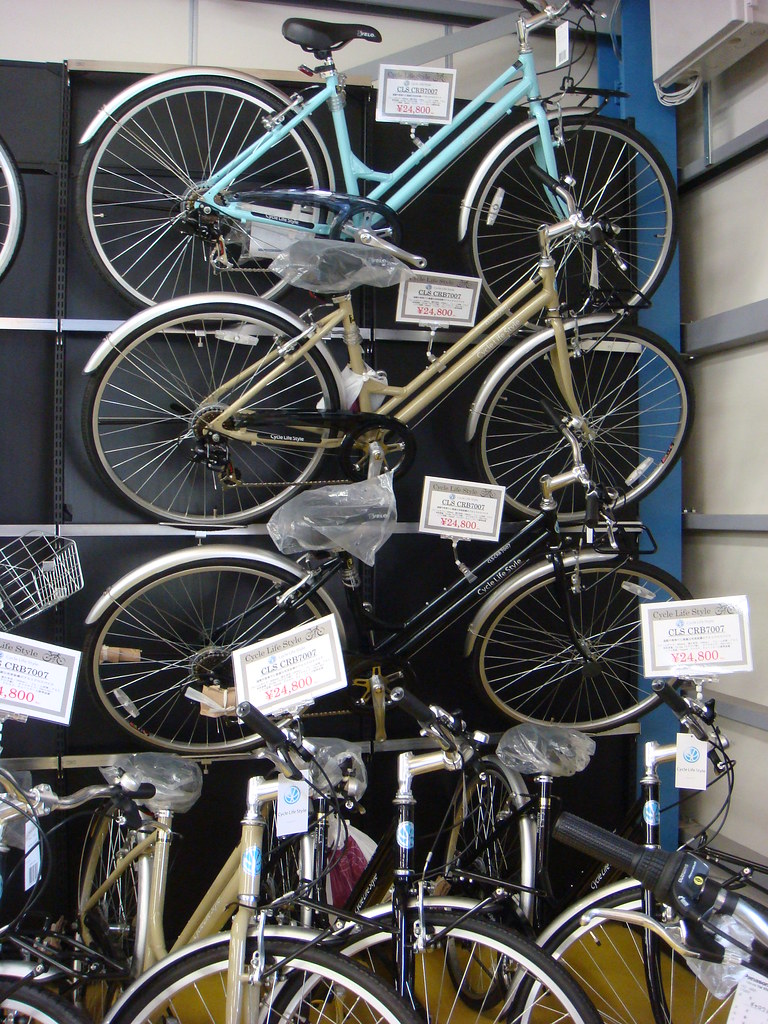
They have these bikes under the same brand of "Cycle Life Style". They seem like pretty nice bikes with derailleurs and everything, but Kao said that these are only around $200. Not having ridden them I don't know about their quality, but I think similar bikes could easily cost twice in the US.
On my July 4th ride, I was hoping I would ride through some nice scenery like some country roads with lots of trees, but what I got instead was not all too inspiring. It was sort of like sprawl. It wasn't anything like the sprawl you see in California or New Jersey, but it did feel more sprawl like compared to central Portland.

I also noticed that there was almost no one on bikes. It was July 4th, but there were cars and people waiting to ride the light rail train. I started thinking why that was. Maybe it's too much for most people to ride 30 minutes to an hour at a good steady pace just to get into the city. The houses themselves look like nice places to live, but there is just nothing else there. So, I think if I lived there and didn't ride a bike, I would probably drive into town quite often just to fill a void that I can't quite explain.
I spent my teenage years in a Southern California town called Irvine. I haven't been back there for more than 10 years and I don't know what it is like now, but back then it was what you might called Suburbia. It was a safe and clean environment, but I always felt like there was something missing. I couldn't really put my finger on it until I read James Howard Kunstler's "Geography of Nowhere". The book really articulated it into words what it was that made me feel uncomfortable in a seemingly wholesome environment. I won't try and summarize the book here as I am sure I won't do it justice, but Jim Kunstler is in favor of Traditional Neighborhood Development where the residents have access to most everyday needs within walking distance. He does like bicycles and likes riding them, but in his view, he is not sure whether we will be able to keep on riding them in the future. He has what many people think of as a pessimistic view of the future (he calls himself a realist) where resources will be in very limited supply and we may not be able to continue manufacturing bicycles and its parts the way we do today. That is unfortunate as I am a big fan of his writing and I think if he could incorporate bicycles as transportation into his world view, I think we would really have the perfect guideline for the future.
I have been reading quite a bit of pretty scary news about climate change. The primary reason that I ride my bike has nothing to do with the environment, but it baffles me that so many people everywhere keep driving their cars like there is no problem. Of course it's not just cars and there are many different factors contributing to the climate crisis, but driving cars definitely does not help the situation.

Sprawl takes shape on the outskirts of cities with fairly large houses on large plots of land. I assume people choose to live there because it's more affordable and they can live in a more spacious environment. The houses and the big yards themselves are quite nice (except for the 2 car garage and the driveway) , but not having any place to just walk to and enjoy is a big drawback. I am not sure everybody living there needs so much space and I think if they were able to do so, they would move closer to the center of the city. If Portland really wanted to become North America's premier bike friendly city, they could take after Groningen, Netherlands and make the center of the city car free. That would make a lot of space available for new development. There are a number of condo buildings going up in my part of Portland, but I think only the real wealthy would be able to live there. Instead if there were more affordable and well designed housing within the city, a lot of people could move into the city and be able to ditch their cars as they will be able to walk or ride a bike for most everyday activities.
Anyway, that's just some thoughts (and wishful thinking) I had after riding and seeing the sprawling outskirts of Portland. I don't know if I was successful in conveying what I wanted to say, but I welcome any comments if you have any thoughts on what I've written.




Good points. I sometimes long for a yard but wouldn't trade the walkability of my neighborhood for it! Of course, older neighborhoods with smaller homes on smaller lots avoid that problem.
ReplyDeleteYes, we too want to live in a house with a yard and have a vegetable garden, but I don't think I would live in a place where the surrounding is dreadful. Like you say, I think it's possible to have both things if city planning is done right.
ReplyDelete